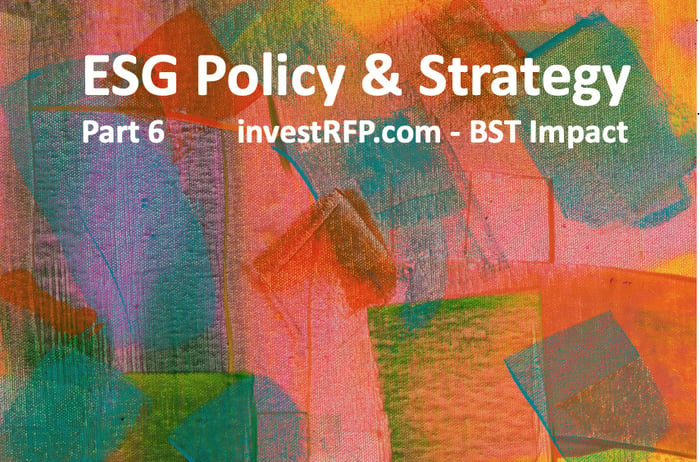

© Steve Johnson
By Kristina Touzenis, Managing Partner BST-Impact Respect of Human RightsThere is no doubt that business enterprises can impact the entire range of human rights positively or negatively, including discrimination, health, access to education, labour exploitation freedom of association and to form unions, freedom of expression, privacy, adequate standard of living (not in poverty), food and water, housing.So, what does it mean to “respect” human rights when one is a private enterprise? It means taking active steps to be in line with human rights obligations, often even if not always enshrined in national laws and regulations. A State has an obligation to exercise due diligence under its obligation to protect. A non-state actor has such an obligation in order to respect rights. That means first of all having internal policies which from an internal governance perspective sets up a regulatory framework safeguarding workers – all the way down the supply chain – as well as the more extended communities in which the enterprise operates.ESG from an investor perspective is a translation of the Sustainable Development Goals (SDGs) engagement of a company into what financial analysts measures as ESG performance, and it is clear that investors have a growing appetite to benchmark companies against each other in terms of that performance. There is a recognition of the fact that there is no reaching the SDGs without a rights based approach and by taking action to address systemic rights issues in workplaces, value chains and the societies in which they operate, sell and invest companies can lift people out of poverty, discrimination and abuse. Anchoring the S within a rights language and a rights based approach also helps us understand what the S in ESG actually is.  This article is the Part 6 of a series on "ESG Policy & Strategy"Part 1: Why asset owners need a good sustainable investment policy and strategy?Part 2: SFDR aims at preventing greenwashing and ensuring data comparabilityPart 3: Working towards the SDGs - at 360 degreesPart 4: Due Diligence, Supervision and Enforcement MechanismsPart 5: Bringing down to "Earth"Part 6: Private ImpactPart 7: ESG as a real sustainability toolPart 8: Awareness and attention towards rights and starndardsPart 9: Cyclical ProcessPart 10: ESG Policy & Strategy – Key QuestionsExpert/Specialist Feedback on investRFP | Kristina Touzenis | BST-Impact
This article is the Part 6 of a series on "ESG Policy & Strategy"Part 1: Why asset owners need a good sustainable investment policy and strategy?Part 2: SFDR aims at preventing greenwashing and ensuring data comparabilityPart 3: Working towards the SDGs - at 360 degreesPart 4: Due Diligence, Supervision and Enforcement MechanismsPart 5: Bringing down to "Earth"Part 6: Private ImpactPart 7: ESG as a real sustainability toolPart 8: Awareness and attention towards rights and starndardsPart 9: Cyclical ProcessPart 10: ESG Policy & Strategy – Key QuestionsExpert/Specialist Feedback on investRFP | Kristina Touzenis | BST-Impact
As with the SDGs there can be no real ESGsif we do not put the Rights squarelyin the middle – or rather squarely as a foundation.
At times human rights and international norms are listed as only one point under “S” instead of being understood as the foundation for sustainability – and most certainly as the foundation for the “S”. Human rights and a rights based approach must be understood as underpinning the efforts made both on E and S and incorporated into G – thus it may be most clearly found under “S” but it really must be mainstreamed into all components.Rights cannot be an isolated pillar but must be connected throughout the ESG discourse. But clearly it is the S that is directly about “people”. Even if it would be meaningless to disassociate it from the E and G – people live in the Environment and influence the Environment. It is clear that countries in which living standards for people are high there is an increased focus on how to be ecological, how to recycle how to buy more responsibly. Because the people have the possibility to not only focus on the next meal, people get the necessary education to make these choices and have the possibility to say “no” to jobs in industries that damage the environment and to even influence political decisions on whether such industries can operate in society and how.For any company focusing on the S means focusing on workers, including in supply chains; customers; and people in affected communities – largely speaking those are the communities in which they operate both when producing as well as selling. If the S is about human beings – individually, as groups and making up societies then the guidance on how to promote S is clearly linked to respect for rights. Countries with higher degrees of respect for rights experience higher economic growth rates and higher levels of human development. Broadly speaking human rights standards also set up a framework which protects consumers, including by guaranteeing participation and socio-economic rights which underpin prosperous and safe societies, thus respect for rights is important both for good production conditions as well as good consumption conditions. This article is the Part 6 of a series on "ESG Policy & Strategy"Part 1: Why asset owners need a good sustainable investment policy and strategy?Part 2: SFDR aims at preventing greenwashing and ensuring data comparabilityPart 3: Working towards the SDGs - at 360 degreesPart 4: Due Diligence, Supervision and Enforcement MechanismsPart 5: Bringing down to "Earth"Part 6: Private ImpactPart 7: ESG as a real sustainability toolPart 8: Awareness and attention towards rights and starndardsPart 9: Cyclical ProcessPart 10: ESG Policy & Strategy – Key QuestionsExpert/Specialist Feedback on investRFP | Kristina Touzenis | BST-Impact
This article is the Part 6 of a series on "ESG Policy & Strategy"Part 1: Why asset owners need a good sustainable investment policy and strategy?Part 2: SFDR aims at preventing greenwashing and ensuring data comparabilityPart 3: Working towards the SDGs - at 360 degreesPart 4: Due Diligence, Supervision and Enforcement MechanismsPart 5: Bringing down to "Earth"Part 6: Private ImpactPart 7: ESG as a real sustainability toolPart 8: Awareness and attention towards rights and starndardsPart 9: Cyclical ProcessPart 10: ESG Policy & Strategy – Key QuestionsExpert/Specialist Feedback on investRFP | Kristina Touzenis | BST-Impact | aboutKristina Touzenis is the Managing Partner of BST Impact. A lawyer and a recognized leader in the effective and concrete operationalization of international human rights standards and principles in complex settings worldwide requiring long-term engagement with a multitude of stakeholders, form both the public and private sectors. She has more than 20 years of experience in advocacy, human rights reporting, monitoring, and evaluating as well as in policy making and negotiating at national, regional, and global level. Kristina founded BST Impact with two other partners in mid 2020, together with a pool of experts to help companies and investors to effectively operationalize ESG criteria, SDGs, international norms and the Business and Human Rights agenda into their respective sustainable business strategies, investment processes and risk assessment management systems. Previously, Kristina created the International Law Unit at the International Organization for Migration – IOM, the UN Agency for Migration and served as Head of the Unit from 2011 to 2020. She engaged with government counterparties on legislation development and review as well as with other Agencies within the UN common system, on advocacy and implementation of programmes worldwide. Prior to her appointment at the IOM HQ, Kristina worked from 2006 to 2011 in the IOM Regional Office for the Mediterranean Region, on translating international norms and standards into practice on the ground and from 2002 to 2006 on implementing children’s rights in the Mediterranean Region for an NGO.
All opinions expressed are those of the author. investESG.eu is an independent and neutral platform dedicated to generating debate around ESG investing topics.
Published by
 investESG
investESG
 investESG
investESG

